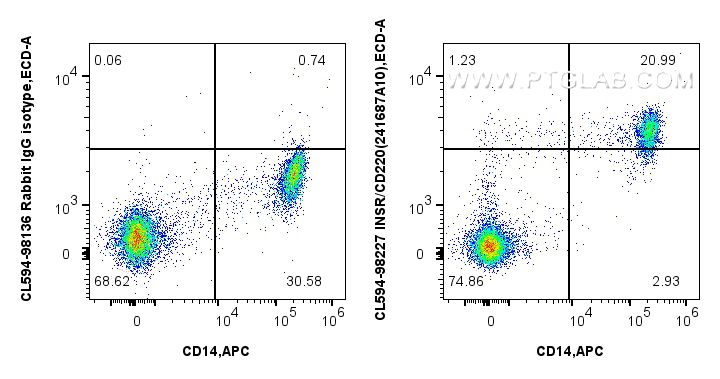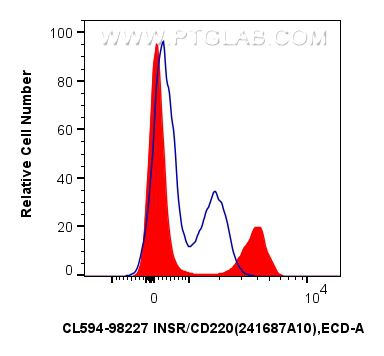Anticorps Recombinant de lapin anti-INSR/CD220
INSR/CD220 Recombinant Antibody for FC
Hôte / Isotype
Lapin / IgG
Réactivité testée
Humain
Applications
FC
Conjugaison
CoraLite®594 Fluorescent Dye
CloneNo.
241687A10
N° de cat : CL594-98227
Synonymes
Galerie de données de validation
Applications testées
| Résultats positifs en cytométrie | CMSP humaines |
Dilution recommandée
| Application | Dilution |
|---|---|
| This reagent has been pre-titrated and tested for flow cytometric analysis. The suggested use of this reagent is 5 ul per 10^6 cells in a 100 µl suspension or 5 ul per 100 µl of whole blood. | |
| Sample-dependent, check data in validation data gallery | |
Informations sur le produit
CL594-98227 cible INSR/CD220 dans les applications de FC et montre une réactivité avec des échantillons Humain
| Réactivité | Humain |
| Hôte / Isotype | Lapin / IgG |
| Clonalité | Recombinant |
| Type | Anticorps |
| Immunogène | Protéine recombinante |
| Nom complet | INSR |
| Numéro d’acquisition GenBank | BC117172 |
| Symbole du gène | INSR |
| Identification du gène (NCBI) | 3643 |
| Conjugaison | CoraLite®594 Fluorescent Dye |
| Excitation/Emission maxima wavelengths | 588 nm / 604 nm |
| Forme | Liquide |
| Méthode de purification | Purification par protéine A |
| Tampon de stockage | PBS with 0.09% sodium azide and 0.5% BSA |
| Conditions de stockage | Store at 2-8°C. Avoid exposure to light. Stable for one year after shipment. |
Informations générales
The biological effects of INS are mediated by a membrane-spanning cell surface receptor that has been shown to consist of disulfide-linked alpha-subunits (135 kDa) and beta-subunits (95 kDa) that are cleaved products of a common precursor. The binding of INS to the receptor extracellular domain results in intracellular activation of a tyrosine-specific kinase activity and the generation of signals that determine the cellular response (PMID: 2369896).
Protocole
| Product Specific Protocols | |
|---|---|
| FC protocol for CL594 INSR/CD220 antibody CL594-98227 | Download protocol |
| Standard Protocols | |
|---|---|
| Click here to view our Standard Protocols |



